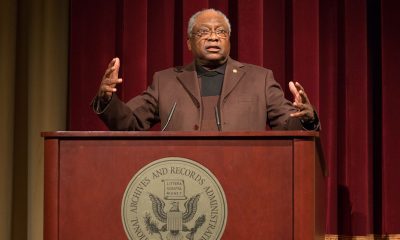National
Rosa Parks’ Archive Opening to Public at Library of Congress

A photograph of Rosa Parks circa the 1950’s and a paper written by Parks about segregation are some of the items in the Rosa Parks archive, seen during a media preview at the Library of Congress, Madison Building, in Washington, Thursday, Jan. 29, 2015. (AP Photo/Jacquelyn Martin)
BRETT ZONGKER, Associated Press
WASHINGTON (AP) — Rosa Parks, who refused to give up her seat on a segregated bus, reflected later on how it felt to be treated less than equal and once feistily wrote of how tired she was of being “pushed around” — parts of her history long hidden away.
Beginning Wednesday at the Library of Congress, researchers and the public will have full access to Parks’ archive of letters, writings, personal notes and photographs for the first time. The collection will provide what experts call a more complex view of a woman long recalled in history for one iconic image — that of a nonviolent seamstress who inspired others to act at the dawning of the civil rights era.
A protracted legal battle between her heirs and friends had kept the collection from public view for years. But in 2014, philanthropist Howard Buffett bought the collection and placed it on long-term loan at the national library. The Associated Press has previously reported on the legal wrangling that kept Parks’ archive warehoused for years. Until now, scholars have had very limited, if any, access to the materials.
“I think it’s one of the first times we’re actually able to read her voice, and it just totally goes against this image of the quiet seamstress,” said Margaret McAleer, an archivist at the library. “Her writings are phenomenally powerful.”
Parks, who died in 2005 at 92, is beloved in American history for her civil disobedience on a Montgomery, Alabama bus. That defining moment in 1955 triggered a yearlong bus boycott that helped dismantle a system of segregation.
“I had been pushed around all my life and felt at this moment that I couldn’t take it anymore,” she wrote. “When I asked the policeman why we had to be pushed around, he said he didn’t know. ‘The law is the law. You are under arrest.’ I didn’t resist.”
Parks also wrote of feeling lonely and lost living through the struggle with segregation.
After her arrest, Parks lost her job as a tailor at Montgomery’s largest department store because of her activism. Her husband, Raymond, lost his job, too, and the couple sank into deep poverty. They moved to Detroit but continued to struggle.
She traveled with the NAACP, pressing for civil rights, and eventually landed a job at the Hampton Institute in Virginia earning $3,700 a year — enough to send some money home to her husband and mother. It wasn’t until 1965 when Parks was hired for the district office of Michigan Rep. John Conyers that she finally earned a steady, living wage, archivists said.
Parks’ archive provides scholars and the public with a fuller sense of her life and faith, her personality and her pain, said library historian Adrienne Cannon.
“It’s important because we see Rosa Parks in a kind of almost frozen, iconic image — a hero that is not really real flesh and blood,” Cannon said. “Here we get a sense of a woman that is really full flesh and blood.”
The collection may surprise people by revealing Parks had an aggressive edge and supported more radical actions seeking equality over the years, archivists said. She used her symbolic status to support Malcolm X, Black Panther gatherings and the Wilmington 10 in North Carolina.
“She was so deeply opposed to segregation that as the younger generation came along, she didn’t hold back from them. She was in the fight,” said Helena Zinkham, the library’s collections director.
The library now holds about 7,500 manuscript items and 2,500 photographs from Parks, including the Bible she kept in her pocket, letters from admirers and her Presidential Medal of Freedom. A small exhibit is planned for March. All the items will be digitized and posted online.
Artifacts such as Parks’ clothing, furniture and a pillbox hat she may have worn on the Montgomery bus, will find homes elsewhere. The library plans to place them with other museums or institutions that can conserve and display Parks’ belongings. The library already is in talks with the Smithsonian’s National Museum of African-American History and Culture, now under construction on the National Mall, to possibly house some of the items.
___
Follow Brett Zongker on Twitter at https://twitter.com/DCArtBeat.
Copyright 2015 The Associated Press. All rights reserved. This material may not be published, broadcast, rewritten or redistributed.
Activism
Oakland Post: Week of April 17 – 23, 2024
The printed Weekly Edition of the Oakland Post: Week of April 17 – 23, 2024

To enlarge your view of this issue, use the slider, magnifying glass icon or full page icon in the lower right corner of the browser window. ![]()
Barbara Lee
Congresswoman Barbara Lee Issues Statement on Deaths of Humanitarian Aid Volunteers in Gaza
On April 2, a day after an Israeli airstrike erroneously killed seven employees of World Central Kitchen (WCK), a humanitarian organization delivering aid in the Gaza Strip, a statement was release by Rep. Barbara Lee (D-CA-12). “This is a devastating and avoidable tragedy. My prayers go to the families and loved ones of the selfless members of the World Central Kitchen team whose lives were lost,” said Lee.

By California Black Media
On April 2, a day after an Israeli airstrike erroneously killed seven employees of World Central Kitchen (WCK), a humanitarian organization delivering aid in the Gaza Strip, a statement was release by Rep. Barbara Lee (D-CA-12).
“This is a devastating and avoidable tragedy. My prayers go to the families and loved ones of the selfless members of the World Central Kitchen team whose lives were lost,” said Lee.
The same day, it was confirmed by the organization that the humanitarian aid volunteers were killed in a strike carried out by Israel Defense Forces (IDF). Prior to the incident, members of the team had been travelling in two armored vehicles marked with the WCF logo and they had been coordinating their movements with the IDF. The group had successfully delivered 10 tons of humanitarian food in a deconflicted zone when its convoy was struck.
“This is not only an attack against WCK. This is an attack on humanitarian organizations showing up in the direst situations where food is being used as a weapon of war. This is unforgivable,” said Erin Gore, chief executive officer of World Central Kitchen.
The seven victims included a U.S. citizen as well as others from Australia, Poland, the United Kingdom, Canada, and Palestine.
Lee has been a vocal advocate for a ceasefire in Gaza and has supported actions by President Joe Biden to airdrop humanitarian aid in the area.
“Far too many civilians have lost their lives as a result of Benjamin Netanyahu’s reprehensible military offensive. The U.S. must join with our allies and demand an immediate, permanent ceasefire – it’s long overdue,” Lee said.
Commentary
Commentary: Republican Votes Are Threatening American Democracy
In many ways, it was great that the Iowa Caucuses were on the same day as Martin Luther King Jr. Day. We needed to know the blunt truth. The takeaway message after the Iowa Caucuses where Donald Trump finished more than 30 points in front of Florida Gov. De Santis and former South Carolina Governor Nikki Haley boils down to this: Our democracy is threatened, for real.

By Emil Guillermo
In many ways, it was great that the Iowa Caucuses were on the same day as Martin Luther King Jr. Day.
We needed to know the blunt truth.
The takeaway message after the Iowa Caucuses where Donald Trump finished more than 30 points in front of Florida Gov. De Santis and former South Carolina Governor Nikki Haley boils down to this: Our democracy is threatened, for real.
And to save it will require all hands on deck.
It was strange for Iowans to caucus on MLK day. It had a self-cancelling effect. The day that honored America’s civil rights and anti-discrimination hero was negated by evening.
That’s when one of the least diverse states in the nation let the world know that white Americans absolutely love Donald Trump. No ifs, ands or buts.
No man is above the law? To the majority of his supporters, it seems Trump is.
It’s an anti-democracy loyalty that has spread like a political virus.
No matter what he does, Trump’s their guy. Trump received 51% of caucus-goers votes to beat Florida Gov. Ron DeSantis, who garnered 21.2%, and former South Carolina Gov. Nikki Haley, who got 19.1%.
The Asian flash in the pan Vivek Ramaswamy finished way behind and dropped out. Perhaps to get in the VP line. Don’t count on it.
According to CNN’s entrance polls, when caucus-goers were asked if they were a part of the “MAGA movement,” nearly half — 46% — said yes. More revealing: “Do you think Biden legitimately won in 2020?”
Only 29% said “yes.”
That means an overwhelming 66% said “no,” thus showing the deep roots in Iowa of the “Big Lie,” the belief in a falsehood that Trump was a victim of election theft.
Even more revealing and posing a direct threat to our democracy was the question of whether Trump was fit for the presidency, even if convicted of a crime.
Sixty-five percent said “yes.”
Who says that about anyone of color indicted on 91 criminal felony counts?
Would a BIPOC executive found liable for business fraud in civil court be given a pass?
How about a BIPOC person found liable for sexual assault?
Iowans have debased the phrase, “no man is above the law.” It’s a mindset that would vote in an American dictatorship.
Compare Iowa with voters in Asia last weekend. Taiwan rejected threats from authoritarian Beijing and elected pro-democracy Taiwanese vice president Lai Ching-te as its new president.
Meanwhile, in our country, which supposedly knows a thing or two about democracy, the Iowa caucuses show how Americans feel about authoritarianism.
Some Americans actually like it even more than the Constitution allows.
About the Author
Emil Guillermo is a journalist and commentator. He does a mini-talk show on YouTube.com/@emilamok1.
-

 Activism4 weeks ago
Activism4 weeks agoOakland Post: Week of March 20 – 26, 2024
-

 #NNPA BlackPress3 weeks ago
#NNPA BlackPress3 weeks agoCOMMENTARY: D.C. Crime Bill Fails to Address Root Causes of Violence and Incarceration
-

 #NNPA BlackPress3 weeks ago
#NNPA BlackPress3 weeks agoMayor, City Council President React to May 31 Closing of Birmingham-Southern College
-

 #NNPA BlackPress3 weeks ago
#NNPA BlackPress3 weeks agoCOMMENTARY: Lady Day and The Lights!
-

 #NNPA BlackPress3 weeks ago
#NNPA BlackPress3 weeks agoFrom Raids to Revelations: The Dark Turn in Sean ‘Diddy’ Combs’ Saga
-

 #NNPA BlackPress3 weeks ago
#NNPA BlackPress3 weeks agoBaltimore Key Bridge Catastrophe: A City’s Heartbreak and a Nation’s Alarm
-

 #NNPA BlackPress3 weeks ago
#NNPA BlackPress3 weeks agoBaltimore’s Key Bridge Struck by Ship, Collapses into Water
-

 Activism3 weeks ago
Activism3 weeks agoOakland Post: Week of March 27 – April 2, 2024



















































